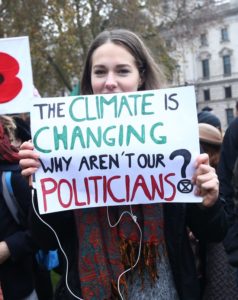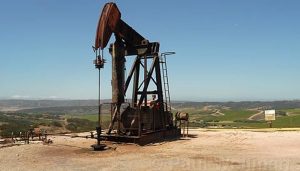Extinction Rebellion is coming to Hereford. This Saturday, 1st December, we will hold our inaugural action, starting on Castle Green at 11.00 am. I have the honour of being one of the speakers. Each of us has just a few minutes. I doubt if I’ll have time to talk about many aspects, so let me expand a bit here. This is both deeply personal and of planetary importance.
Many of my generation have been active campaigning for ecological sustainability and social justice since the late 1960’s, and before that there was a long tradition of concern and action. Over all these decades humanity made some steps in the right direction, but larger ones in totally the wrong direction. We cleaned up rivers and created national parks and wildlife reserves, eradicated smallpox, lifted millions out of poverty, spread literacy and achieved much else. However over these same decades carbon emissions grew, ever more habitats were lost and species made extinct. As some forms of pollution were clamped down on others expanded rapidly.
The prospect of the extinction of our own species is very real. This is personal. By the time my grandchildren are reaching old age the planet may simply be uninhabitable. Atmospheric carbon dioxide is now at over 405 parts per million. This is destabilizing the climate and it is also causing the acidification of the oceans. Humanity is utterly dependent on a well functioning biosphere. As oceans become more acidic phytoplankton die, and without phytoplankton the oxygen cycle breaks down, threatening the ability of large mammals, such as human beings, to breathe. Phytoplankton die-off due to ocean acidification is just one of numerous tipping points beyond which we must not pass. To safeguard our existence as a species we need to change our global political and economic systems. The latest science suggests we need to reduce global carbon emissions to zero within twelve years. To do this will require extraordinary levels of commitment. It will require unprecedented action from governments, who currently seem totally unprepared and unaware of the situation humanity is in.
As I’ve said numerous times on this blog, technologically and philosophically there is so much we could do: the obstacles are largely political. Extinction Rebellion has been formed to force governments to take action by engaging in non-violent protest, which will often involve some, but not all participants taking action for which they may be arrested. In London this has largely been blocking roads, occupying government buildings and similar things. Extinction Rebellion groups are now springing up all around the world.
Extinction Rebellion fits into a crowded field of people hungry for change. The school strikes for climate action started a few weeks ago in Sweden with 15 year old Greta Thunberg, and are now spreading fast, with kids from 100 towns in Sweden and over 260 places worldwide on strike today.
We need many diverse voices calling for rapid and bold action on climate change, biodiversity loss, pollution and the rest, and we need politicians capable of listening to them and taking the required action. We don’t have long.




